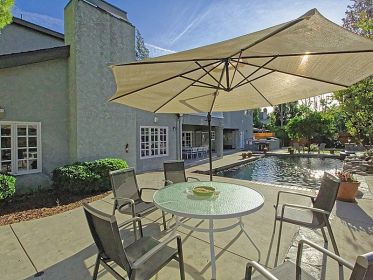Relapse Prevention In Los Angeles, CA
Long-Term Recovery & Relapse Prevention
Our program for relapse prevention in Los Angeles begins immediately following detox. No need to wait until aftercare.
People in recovery need to understand how drug and alcohol addiction manifests in them following detox. Once they identify their addictive behaviors and relapse triggers, they must learn how to manage those thoughts and urges on a regular basis.
Successful management of cravings and triggers, as well as daily stressors and co-occurring mental health symptoms, is the foundation of long-term recovery.
A strong relapse prevention plan is like a roadmap guiding you toward continued sobriety
Los Angeles Relapse Prevention Education
Harmony Place’s program educates our clients on topics including, but not limited to:
-
The Progression of Addiction
-
The Disease Concept
-
Post-Acute Withdrawal and Addictive Preoccupations
-
Internal and External Threats to Stabilization
-
Identifying and Managing Relapse Warning Signs and Triggers
-
Development of Coping Strategies
-
Developing a Personal Relapse Prevention Plan
In our residential program, relapse prevention education takes place in group settings for one hour at least three times per week. As clients progress to an outpatient level of care, they will continue to receive this education. In addition, our specialists will work with each client to build out a personalized aftercare and relapse prevention plan.
From the moment you begin treatment at Harmony Place, our team is already starting to consider your long-term recovery plan. As you progress through residential care into outpatient treatment and we come to better understand your likes, dislikes, and everything unique about you. Your relapse prevention plan becomes more robust and individualized as a result.
When you complete our outpatient treatment, your unique aftercare plan will connect you to some or all of the following:
- Health care providers
- Support groups (for example, Alcoholics Anonymous or AA)
- Sober companions
- Personal trainers or fitness studios
- Helpful reading material
- Community resources
- Valuable online resources
- Aftercare services
Along with our input, these resources will become an invaluable support network that keeps you accountable and helps stave off relapse from the first difficult months after rehab to years down the road.

Call Us 24/7: (855) 652-9048
Why is Relapse Prevention So Important in Recovery from Addiction?
Recovery doesn’t end when a client completes our program and leaves our facilities. The hardest part can be going back home to your old life. It doesn’t matter if you have been through a program before, if this is your first time, or if you’ve been sober for many years.
While “relapse” is not an inevitable stage of change, it is best to address it by acknowledging that the potential for relapse is real. Steps must then be taken to plan for prevention while the client is clear in mind and body.
This is why we start relapse prevention education in Los Angeles early and carry it through the entirety of a client’s extensive time in rehab treatment (up to 90 days). This invaluable education and a customized aftercare plan give clients coping strategies and resources to turn to when struggles arise in recovery.

Request a 100% Confidential Callback
Relapse Prevention FAQs
Relapse prevention is a broad topic, so it’s likely you have a few additional questions about what it entails. Browse through our FAQs below to see if we have your answer:
As you progress through recovery, you will come to understand the many high-risk situations that could test your resolve in staying sober. High-risk situations can refer to people, places, objects, and specific scenarios.
The high-risk scenarios depend on the individual, but some general ones include:
- Places you associate with past substance use, such as a bar
- People you used to hang out with and drink or do drugs together
- Situations in which your former substance of choice is available, such as a party
- Moments filled with excessive stress or boredom
- Social situations that caused stress or anxiety and drove you to substance use
- Hobbies or activities that involved or were associated with substance use
Triggers are objects, people and situations that the brain associates with taking a substance and the pleasurable sensation that follows. (For examples, see the “high-risk scenarios” list above.) Even a certain print or online advertisement can trigger somebody toward substance use. Seeing characters drink in a movie might trigger those who struggle with alcohol use.
Cravings are the desire to experience the positive effects of taking a substance. These are actual physical compulsions or urges resulting from the release of dopamine in the brain. Someone recovering from alcoholism, for example, might get a sudden craving for the taste of a certain beer and the buzz it creates.
Relapse prevention education at Harmony Place focuses on understanding one’s own triggers and cravings and then learning techniques for managing them in recovery, because they will certainly strike at one point or another.
There are many precursors to relapsing into active addiction. Experts in the recovery field often say relapse begins with our thoughts, feelings, and behaviors before we ever pick up a drink or a drug. Anxiety is one such trigger that can lead to relapse, unless we take steps to address it.
Anxiety is characterized by an unrealistic fear of the future that causes people to feel excessively nervous or worried. Anxiety also produces irritability, anger, and hypersensitivity, and can lead to difficulty in concentrating, sleeping, and socializing. When these feelings persist over a period of months, it can be diagnosed as generalized anxiety disorder.
The longer we suffer from anxiety, the more imminent the possibility of relapse. We may think our only relief from anxiety is to self-medicate with drugs, alcohol, and other addictive behaviors. “Treating” our anxiety with mind-altering substances or compulsive behaviors, however, only serves to make us more anxious, not less.
Treatment and Self-Help Techniques for Anxiety
The professional treatment of choice for anxiety is cognitive-behavioral therapy, which teaches clients to identify the root cause of their feelings and helps them develop coping strategies. Relaxation techniques such as meditation are also extremely effective in relieving anxiety.
Simply acknowledging an anxiety attack as it’s happening can drastically reduce its power over us. Often, it is what we say to ourselves that relieves our anxiety and restores our balance. When we are experiencing anxiety, we should tell ourselves, “I am safe at this moment. My anxiety is not a reasonable response, and nothing bad is happening right now.”
Worrying about situations we can’t control will not influence the outcome. Worry simply begets more worry, which leaves us feeling helpless. Recognizing these feelings as they arise and remembering to adjust our thinking are the surest ways to stop a potential relapse in its tracks.
It’s important to remember that overcoming anxiety does not happen overnight: remaining calm and “in the moment” takes patience and practice. As with recovery itself, the goal is progress, not perfection.
High-risk situations will inevitably come during recovery, but the individual does have control of how he or she responds. Coping strategies are grouped into three main categories, and here’s an example response for each:
- Behavior: walking away from the high-risk situation
- Emotion Management: turning to a specific hobby or activity when feelings of depression or anger begin to overwhelm
- Mental Techniques: using positive self-talk to overcome a high-risk situation
Although it’s not recommended to replace one addiction with another, there are a number of hobbies and activities that are playfully referred to as “positive addictions” and have shown to help with physical, mental and spiritual well-being.
Examples of positive addictions to turn to in recovery include:
- Sports
- Working out
- Yoga
- Meditation
- Reading/book clubs
- Bible studies
- Volunteering
Harmony Place extends a number of alumni and aftercare services to all alumni of our treatment programs.
Our alumni and aftercare program includes:
- Alumni Group Gatherings – for activities such as basketball tournaments, karaoke, ice cream socials, etc.
- Mentor Group Sessions – meets weekly at our residential facility
- Facebook Group for Alumni
- Online Alumni Support Group
-
Absolutely the best recovery center around.
I am forever grateful to have had this experience. I would recommend anyone who wanted help to come here. This place literally saved my life. I have overcome so many obstacles that always stood in the way of my recovery. It’s not just because I was ready… the approaches the therapists use come from an empathetic, compassionate, and understanding place. They were able to hold the mirror up and help guide me through making solid changes.
Daniel H.
August 2017 -
This place literally saved my life.
After overdosing, my parents forced me to check into rehab.After interviewing many other facilities, I decided to go to Harmony Place from my home in Phoenix. I was struggling with…a drug addiction and had been trying for years to recover. In the past, left 2 treatment centers AMA and 1 AWOL. I had very negative experiences in the other treatment facilities, especially with my therapists, so I didn’t go in with an open mind or good attitude- even though they worked with my parents regarding finances. However, the staff was patient with me. The techs were kind, knowledgeable, and many were in recovery themselves.
Mary M. -
They Answered on the First Call
When I called Harmony Place…I knew immediately that this was the right place for my child… Harmony Place is specifically designed for…and tailored to providing a safe environment. The staff [are knowledgeable and some are in recovery]. The staff knew each client and were on top of each client’s progress. Harmony Place has a small clientele and each client are able to receive all the help they were entitled to. I would recommend Harmony Place to anyone who is looking for a small setting… My daughter is currently going into sober living and her counselors did a wonderful job in finding a right fit for her – affordable, safe and a good environment for her.
Robyn
Loved-One -
I’ve Been Searching for the Perfect Words…
I left Harmony Place in August of 2015 and I have been searching for the perfect words to describe my experience during my stay; and still I can’t really find them. How do you really describe a place with a staff and a program that saved you? Addiction is a terrible thing to go through and a heart breaking thing for your loved ones to watch. Many people, including myself go into different treatment centers throughout their addiction searching for ways to find recovery. Nothing worked for me, not the 5 rehab stays I had, then, I came here.
Dominique C.
Alumni
Escape the Chains of Addiction at Harmony Place
Relapse is a reality for many of those who seek treatment for substance use disorder. At Harmony Place, our Los Angeles relapse prevention programs do everything we can to lower relapse rates for our clients and improve their quality of life after leaving our program.
To learn more about our integrative programming, contact us today.
- Inpatient Rehab Los Angeles
- Intensive Outpatient Program Los Angeles
- Evening Intensive Outpatient Program
- Medication Assisted Treatment Los Angeles
- Outpatient Rehab Program Los Angeles
- Los Angeles Partial Hospitalization Program
- Medically Assisted Detox LA
- Sober Living Homes and Halfway Houses
- Clinical Care Los Angeles
- Family Therapy Rehab Program
- Couples Rehab Los Angeles
- Men’s Addiction Rehab California
- Women’s Rehab Center SoCal
- Addiction Treatment for Veterans
- Short-Term Addiction Rehab
- Long-Term Addiction Rehab
- Private Luxury Rehab Los Angeles
- Faith-Based Rehab Programs
- Non-Faith-Based Rehab
- Rehab for Professionals LA
- Rehab Aftercare Alumni Programs




